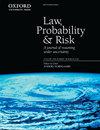从基于特定来源的特征到基于共同来源的分数的似然比系统:对星星进行排名
IF 1.4
4区 社会学
Q1 LAW
引用次数: 1
摘要
本文研究了最常用的源级似然比(LR)系统在应用于跟踪-参考比较问题时的预期性能和实际可行性。本文将这类LR系统(用于更新先验赔率)的性能相互比较,并将其与仅使用先验赔率进行比较,并使用严格适当的评分规则作为性能度量。本文还探讨了LR系统分类的实际可行性。目前的分析允许对这些类型的LR系统进行排序:从基于特定来源的特征到基于公共来源的锚定或非锚定分数。在性能和实际可行性之间进行了权衡,这意味着性能最好的LR系统在实践中是最难实现的,而性能最差的LR系统在实践中是最容易实现的。其他类型的LR系统介于这两个极端之间。一个积极的例外是基于公共源特征的LR系统,它具有良好的性能和相对较低的实验需求。本文还反驳了某些类型的LR系统不应该被使用的说法,通过展示所有系统都有优点(当更新先验概率时),而不是仅仅使用先验概率(即不使用LR系统)。本文章由计算机程序翻译,如有差异,请以英文原文为准。
From specific-source feature-based to common-source score-based likelihood-ratio systems: ranking the stars
This article studies expected performance and practical feasibility of the most commonly used classes of source-level likelihood-ratio (LR) systems when applied to a trace–reference comparison problem. The article compares performance of these classes of LR systems (used to update prior odds) to each other and to the use of prior odds only, using strictly proper scoring rules as performance measures. It also explores practical feasibility of the classes of LR systems. The present analysis allows for a ranking of these classes of LR systems: from specific-source feature-based to common-source anchored or non-anchored score-based. A trade-off between performance and practical feasibility is observed, meaning that the best performing class of LR systems is the hardest to realize in practice, while the least performing class is the easiest to realize in practice. The other classes of LR systems are in between the two extremes. The one positive exception is a common-source feature-based LR system, with good performance and relatively low experimental demands. This article also argues against the claim that some classes of LR systems should not be used, by showing that all systems have merit (when updating prior odds) over just using the prior odds (i.e. not using the LR system).
求助全文
通过发布文献求助,成功后即可免费获取论文全文。
去求助
来源期刊

Law Probability & Risk
MATHEMATICSSTATISTICS & PROBABILITY&-STATISTICS & PROBABILITY
CiteScore
2.10
自引率
28.60%
发文量
8
期刊介绍:
Law, Probability & Risk is a fully refereed journal which publishes papers dealing with topics on the interface of law and probabilistic reasoning. These are interpreted broadly to include aspects relevant to the interpretation of scientific evidence, the assessment of uncertainty and the assessment of risk. The readership includes academic lawyers, mathematicians, statisticians and social scientists with interests in quantitative reasoning.
The primary objective of the journal is to cover issues in law, which have a scientific element, with an emphasis on statistical and probabilistic issues and the assessment of risk.
Examples of topics which may be covered include communications law, computers and the law, environmental law, law and medicine, regulatory law for science and technology, identification problems (such as DNA but including other materials), sampling issues (drugs, computer pornography, fraud), offender profiling, credit scoring, risk assessment, the role of statistics and probability in drafting legislation, the assessment of competing theories of evidence (possibly with a view to forming an optimal combination of them). In addition, a whole new area is emerging in the application of computers to medicine and other safety-critical areas. New legislation is required to define the responsibility of computer experts who develop software for tackling these safety-critical problems.
 求助内容:
求助内容: 应助结果提醒方式:
应助结果提醒方式:


